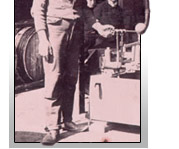 |
 |

|
The search feature does not accept wildcards or regular expressions. It will accept partial words but only from the beginning of the word. For example, in the Mariner field entering the partial word “der” will return the surnames Derby and Dericott, but not the surname Batchelder. To get around some limitations, the following tips may be useful. Viewing all records:. For the General Voyage Database: To view all records in the General Voyage Database type the numeral 1 in the field Voyage Year. The search will return 4383 records and the web page downloaded to your computer will be 4.4 megs. Considering that the average web page is usually not more than 50 kilobytes, this file is exceptionally large. For the “A” Surname Voyage Database: To view all records in the “A” Surname Voyage Database type the numeral 1 in the field Voyage Year. The search will return 659 records. The web page downloaded to your computer will be 586 kb. For the 19th Century Voyage Database: The 19th Century Voyage Database cannot be viewed in its entirety. Containing 6813 records the database server times out before all the records can be downloaded. Because the database contains voyage records for the years 1805, 1815, 1825, 1833, 1835, and 1850 only, to view all the records for a particular year type that year in the field Voyage Year. Numeric Ranges (applies to all databases):To find a numeric range, begin by typing the first number of the numeric value you are seeking. For example, to find all mariners in their 20s type the number 2 in the age field. The result will include all mariners who are 2, in their 20s, and 200 years of age or older. In practise the only ages that will be generated are for those mariners in their 20s. If you wish to find all ages between 31 to 35 inclusive, however, you have to enter age 31, record the number of records found (in this case 70), repeat the procedure for each age up to and including 35, and then add the number of records found for each age to obtain the correct answer. In another example, if you are looking for a range of voyage years, typing the numeral 1 will give you the entire database, typing 17 will provide you with all voyages that occurred in the 18th century; and typing 175 will result in a list of all voyages that occurred from 1750 to 1759. If you wish to find all voyages from 1751 to 1755 inclusive, then you have to enter the year 1751, record the number of records found, repeat the procedure for each year up to and including 1755, and then add the number of records found for each year to obtain the result for which you are seeking. Alphanumeric Searches (applies to all databases): When searching for alphanumeric values such as origin, destination, rank, etc., begin by first entering the full spelling of the word you are seeking. Note the number of records returned. Next repeat the procedure by entering the first few letters of that word and compare the number of records returned with the number of records from the previous search. If the numbers match you may feel fairly secure you have found all the relevant records. Because we often used abbreviations, a name such as Salem which normally we spelled in full, could, on occasion, have been abbreviated to SAL. We attempted to standardize the spelling when preparing the databases for the web, but I suspect several abbreviations may have slipped through. |
|||||||||||||||||||||||||||||||||||||||||||||||||
© 2003 - 2005 Maritime History Archive, Memorial University |